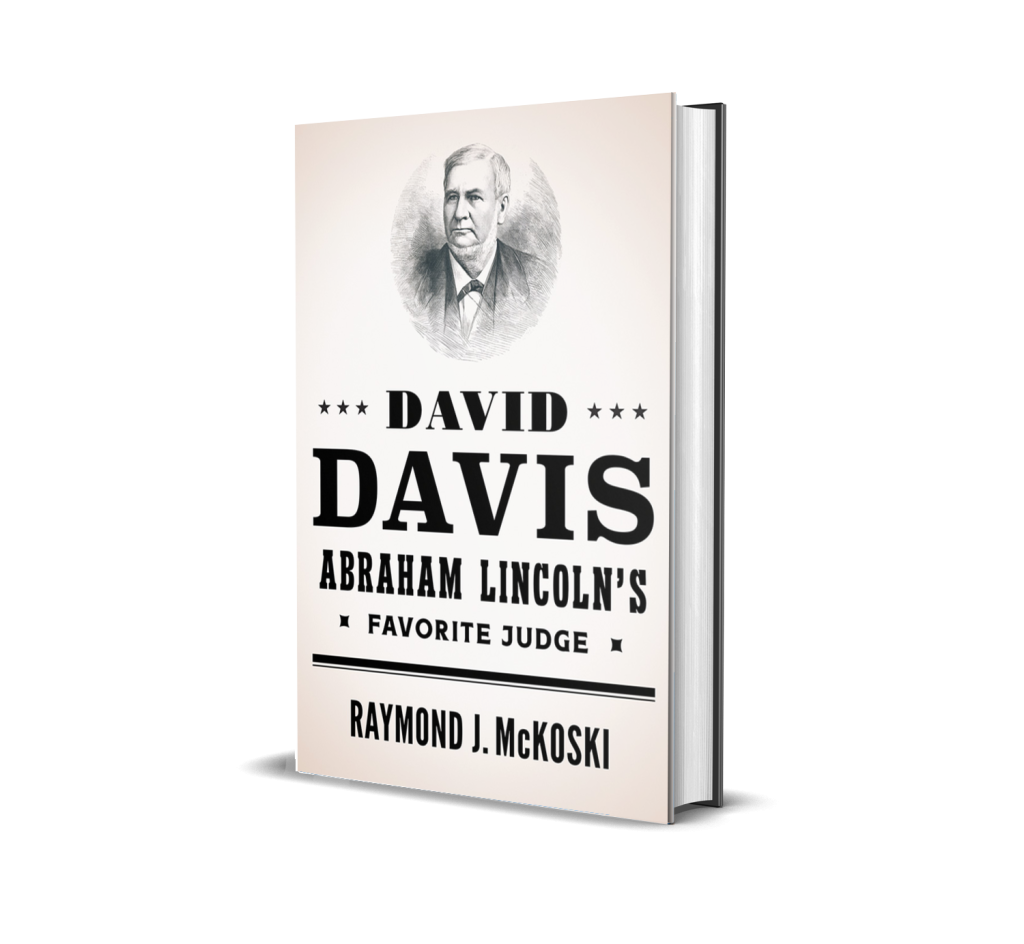Raymond J. McKoski, author of David Davis, Abraham Lincoln’s Favorite Judge, answers questions about his new book.
Q: Why did you decide to write this book?
Returning to our home in northeastern Illinois from a visit to the Abraham Lincoln Presidential Library and Museum in Springfield, my wife and I decided to make an unplanned stop at the David Davis Mansion in Bloomington. The knowledge and enthusiasm of the Mansion’s docent quickly hooked me on the unique and important life of Lincoln’s favorite judge. Who else can say that they had a pillow fight with a future president, served as a US Senator and US Supreme Court Justice, and masterminded the nomination of America’s greatest president?
Q: What is the most interesting discovery you made while researching and writing your book?
There were many discoveries concerning Davis’s and Lincoln’s personal, professional, and political lives. Here is one that has some relevance to today’s political climate.
For reasons explained in the book, in 1877 the Illinois legislature elected David Davis to serve as a US Senator. This was before adoption of the Seventeenth Amendment which provides for the popular election of senators. On the fortieth ballot, with the vote of every Democratic state legislator, Davis defeated the incumbent senator, John Logan, a Republican. Not a single Republican voted for Davis. Although elected by the Democrats, Davis sat on the Republican side of the Senate Chamber and refused to attend either party’s caucus.
Then in 1881 when Vice President Charles Arthur succeeded assassinated president James Garfield, the senators selected a president pro tempore to preside over the Senate in place of now President Arthur. On the unanimous vote of the Republican senators and without a single Democrat’s vote, Davis was elected to the position. The motion to elect Davis president pro tempore was made by the same John Logan whom Davis defeated in 1877. Logan had regained a Senate seat in 1879. Senator Logan also volunteered to do the honor of accompanying Davis to his new seat.
Would the current partisan polarization and enmity allow anything like this to happen today?
Q: What myths do you hope your book will dispel or what do you hope your book will help readers unlearn?
I hope that readers will come to appreciate both aspects of David Davis’s true legacy. As detailed in the book, one pillar of that legacy is Judge Davis’s role in the political rise of Abraham Lincoln. Without Davis heading the Lincoln forces at the Republican presidential nominating convention and without Davis’s leadership in the 1860 general election campaign, Lincoln would not have become president. The second pillar of Davis’s legacy goes virtually unacknowledged: an undivided loyalty to his judicial oath of impartiality. Judge Davis set aside his beliefs and relationships and rendered decisions free from personal, political, and social views; friendships; public pressure; and partisan loyalties. Both as a trial court judge and US Supreme Court justice, Davis consistently demonstrated his commitment to the fabric of the legal system—impartiality on the bench. That steadfast adherence to the judicial oath and rule of law should inspire judges and the public today.
Q: Which part of the publishing process did you find the most interesting?
The entire process was fascinating. I especially enjoyed working with the acquisitions editor and incorporating the suggestions of the two expert reviewers to greatly improve the initial draft of my book.
Q: What is your advice to scholars/authors who want to take on a similar project?
My advice is simply to start writing and do not be discouraged during the sometime laborious process. There will be good and not so good research and writing days. And remember, life is a story. So, make sure that you tell a story.
Q: What do you like to read/watch/or listen to for fun?
Surprise, I like to read history. I also enjoy watching old movies especially “film noir” from the 1940s and 1950s. Like many other film noir buffs, my favorite actor is Barbara Stanwyck.
Raymond J. McKoski is a retired Illinois Circuit Judge and adjunct professor at the University of Illinois Chicago School of Law. He is the author of Judges in Street Clothes: Acting Ethically Off-the-Bench.

